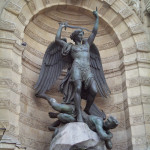We run our website the way we wished the whole internet worked: we provide high quality original content with no ads. We are funded solely by your direct support. Please consider supporting this project.

9 Things That Are True of Us When We’re Saved
Image by rAmmoRRison via Flickr
The New Testament has many amazing things to say about who we are as believers because of what Christ has done for us. When the Lord saves us, he doesn’t just rescue us from eternal death; he gives us a completely new identity.
Consider what happens to us when the Father places us “in Christ”:
- All that is part of our old self, all that is sinful and contrary to God, has been crucified. It is dead (Rom 6:2-11; Gal 2:20).
- We are completely forgiven, perfected for all time, and hence completely reconciled to God (1 Cor 1:2; 2 Cor 5:17-19; Gal 2:16).
- We are completely made new and given Christ’s eternal resurrected life (2 Cor 5:17; Eph 2:5-6, 10).
- We are indwelled with the Spirit of Jesus, the Spirit of God almighty (2 Cor 13:5; Eph 3:17). We are thus made into a temple of God (1 Cor 6:19).
- We are redeemed and set free from the curse of the law (Gal 3:13; 5:1; Col 2:13-15).
- We are seated “in heavenly places” and made partakers of the eternal inheritance Christ purchased for us (Eph 1:3-11: 2:6; 3:6).
- We are hidden in Christ and united with Christ (Rom 6:5; 1 Cor 6:17; Col 3:3). We are made participants in the eternal love that flows within the Triune Godhead (2 Pet 1:4).
- God the Father completely redefines our state of being. Whereas once we were in Adam and “by nature children of wrath” (Eph 2:3), now we are in Christ and are the recipients of the very same eternal, perfect love he has for his Son (Jn 17:34; 26).
- The Father has chosen us and made us “holy and blameless before him in love.” He loves us and lavishes on us “his glorious grace” as he relates to us as we are “in the Beloved,” Jesus Christ (Eph 1:3-6). This means that the relationship God has with us now is defined by the eternal, unsurpassable, loving relationship he has with his eternal Son!
This is who we truly are when we place our trust in Christ. Whether the self-identity we inherited from our upbringing, experiences, and culture agrees with this or not (it probably doesn’t), this is what is true, for this is what God says. By placing us in Christ’s death to sin, the Father makes us dead to sin. By placing us in Christ’s life, the Father makes us alive. By placing us in Christ’s holiness, the Father makes us perfectly holy. And by placing us in Christ’s loveliness, the Father makes us lovely. The almighty God says so!
There is simply nothing anyone can do to improve what God has already done for us in placing us in Christ Jesus. When God saved us, he established us in Christ as being everything he eternally wants us to be. This is what is true about us. This is our true identity. All genuine spiritual growth comes from the Holy Spirit making our true identity real to us and overcoming the self-identity we inherited from the pattern of the world.
—Adapted from Seeing is Believing, pages 27-28.
Category: General
Tags: Gifts, Identity in Christ, Jesus, New Humanity, Salvation
Topics: Following Jesus
Related Reading

The Cruciform Center Part 4: How Revelation Reveals a Cruciform God
I’ve been arguing that, while everything Jesus did and taught revealed God, the character of the God he reveals is most perfectly expressed by his loving sacrifice on the cross. Our theology and our reading of Scripture should therefore not merely be “Christocentric”: it should be “crucicentric.” My claim, which I will attempt to demonstrate…

Predestination Part 2: Seeing Destiny Rightly
For Part 1, click here. In Ephesians Paul teaches that God “chose us in [Christ] before the creation of the world to be holy and blameless in his sight” (Eph 1:4). In Christ, Paul continues, God “predestined us for adoption to sonship…to the praise of his glorious grace, which he has freely given us in…

Seeing and Knowing God
There are many scripture passages that seem to suggest that the way people view God often says more about them than it does about God. Our perception of God, as well as other spiritual truths, is conditioned by the state of our heart. Jesus’ most important teaching on this matter is found in John’s Gospel…

The Twist that Reframes the Whole Story
Many people read the Bible as if everything written within it is equally authoritative. As a result, people read it along the lines of a cookbook. Like a recipe, the meaning and authority of a passage aren’t much affected by where the passage is located within the overall book. The truth, however, is that the…

The Most Quoted Old Testament Verse
No other passage from the Old Testament is quoted more by New Testament authors than Psalm 110:1. Its frequent citation should cause us to pay attention to what is being said. It reads: The Lord says to my lord, “Sit at my right hand until I make your enemies your footstool.” In David’s day, it…

The Danger of the Penal Substitution View of Atonement
About 25 years ago I was traveling on the freeway to somewhere or other and I stopped at a truck stop to get a bite to eat. I sat down at the counter next to this scruffy truck driver who had just started his lunch, and we started up a friendly conversation. Within about fifteen…
